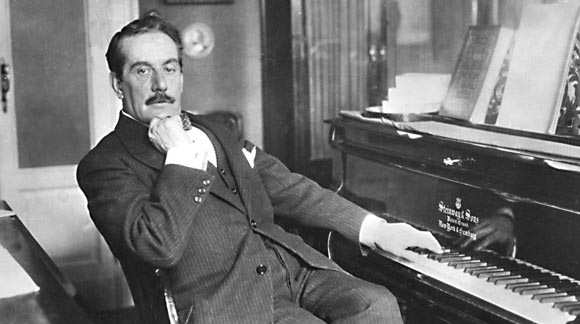
Giacomo Puccini was a highly successful Italian composer of the late romantic era. It has been said that he shares the position of the most important Italian composer of all time with Giuseppe Verdi. He was also known for the development of the verismo style.
Giocomo Puccini was born on December 22, 1858 in Lucca, Tuscany. Puccini’s great-great grandfather was maestro di capella (leader of the orchestra) of the great Cattadrale di San Martino. This position was to be succeeded by Puccini’s ancestral bloodline from his great-great grandfather to his very own father, however, the young Puccini himself was only six years old at the time of his father’s death, and he could not succeed as the maestro di capella. As a child however, Puccini was allowed to perform as part of the Cattadrale’s choir. He was also given several music lessons under the supervision of his uncle Fortunato Magi. At the age of twenty two, Puccini earned a diploma from School of Music, after which he would go to study at the Milan Conservatory on Scholarship.
His first full scale work was arguably the Mass that he wrote in 1880. In 1883, he wrote the “Capriccio Sinfonica”, which was intended as his graduation piece for the Milan Conservatory. The “Capriccio Sinfonica” gathered plenty of attention and acclaim, and soon, Puccini embarked upon his magnificent opera career. In 1884, his opera collaboration with Fernando Fontana titled “Le Villi” was premiered at the Teatro Dal Verme. The success of “Le Villi” prompted publishers to commission the young Puccini to write another opera titled “Edgar”, which was released in 1889. “Edgar” reviews were generally cynical, and they labeled the libretto of the work as weak. As a consequence, Puccini’s next opera, “Manon Lescaut”, had four separate librettists. “Manon Lescaut” is also now thought of as Puccini’s first truly successful opera, and it was with this opera that critics labeled Puccini as the next contender to the great Giuseppe Verdi.
In 1896, his next work, “La Boheme” was premiered in Turin. The opera quickly transgressed national boundaries and was soon being performed all over Europe and North America. Today, it is one of the most performed operas of all time. Puccini then ventured into the verismo tradition with his next masterpiece, “Tosca”.
In 1903, Puccini and his family were part of a car accident that almost killed them. Puccini’s car went off the road, and everyone in the car was flung out, except for Puccini. He was found pinned underneath the wreckage of the car. After he was pulled out, doctors found major fractures in his right leg and chest. The accident hindered the composer’s career, but not for long. In February 1904, “Madama Butterfly” was premiered. However, it had to be revised a total of five times. In 1910, Puccini wrote the “La Fanciulla del West”, which was later considered to be his second most successful opera after “La Boheme”.
Puccini’s career heavily suffered from alleged extra-marital commitments and non-participation in politics. His indifference to World War I and its fallout meant that several of his contracts and commissions were cancelled. Giocomo Puccini died on November 29, 1924, due to complications from throat cancer. He is remembered as the most performed Italian Composer of all time.